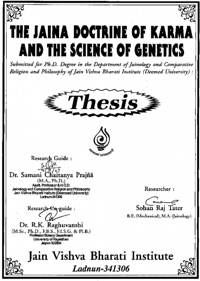Mahavratas[17]
In these vows, non-violence, truthfulness, non-stealing, celibacy and non-possessiveness are observed mentally, verbally and physically in total. Each of these three aspects are further observed in three ways: not committing oneself, not asking anyone else to do so, and not encouraging anyone to do so. Those who wish to observe these vows renounce their worldly lives and become monks and nuns or Aṇagārī.
(i) Savvāo Pāṇivāyāo Virmaṇa Vrata (Absolute Non-violence vow)
In this vow, non violence is observed mentally, verbally and physically in total including for daily needs.
(ii) Savvāo Muṣāvāyāo Virmaṇa Vrata (Absolute Truthfulness vow)
In this vow, lieing is given up mentally, verbally and physically in total. Only the truth is spoken.
(iii) Savvāo Ādinnādānāo Virmaṇa Vrata (Absolute Non-stealing vow)
In this vow, stealing is given up mentally, verbally and physically in total. Nothing is taken unless it is offered by the owner and meets the restrictions of the monkshood life.
(iv) Savvāo Mehuṇāo Virmana Vrata (Absolute Celibacy vow)
Celibacy is observed mentally, verbally and physically in total. Upon taking this vow, one cannot even touch or think about a member of the opposite sex.
(v) Savvāo Pariggahāo Virmaṇa Vrata (Absolute Non-possessiveness vow)
Greed and material possessions are given up mentally, verbally and physically in total. Only items, which are needed to meet out daily requirement are kept.[18]
 Prof. Dr. Sohan Raj Tater
Prof. Dr. Sohan Raj Tater
 Doctoral Thesis, JVBU
Doctoral Thesis, JVBU